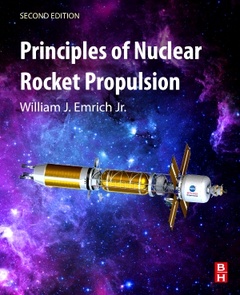Principles of Nuclear Rocket Propulsion (2nd Ed.)

1. Introduction 2. Rocket Engine Fundamentals 3. Nuclear Rocket Engine Cycles 4. Interplanetary Mission Analysis 5. Basic Nuclear Structure and Processes 6. Neutron Flux Energy Distribution 7. Neutron Balance Equation and Transport Theory 8. Multigroup Neutron Diffusion Equations 9. Thermal Fluid Aspects of Nuclear Rockets 10. Turbomachinery 11. Nuclear Reactor Kinetics 12. Nuclear Rocket Stability 13. Fuel Burnup and Transmutation 14. Radiation Shielding of Nuclear Rockets 15. Materials for Nuclear Thermal Rockets 16. Nuclear Rocket Engine Testing 17. Safety Considerations for Nuclear Rocket Engines 18. Advanced Nuclear Rocket Concepts
Appendix I. Table of Physical Constants II. Thermodynamic Properties of Several Gases III. Selected Data from NERVA Tests
- Provides an understanding of the physical principles underlying the design and operation of nuclear fission-based rocket engines
- Includes a number of example problems to illustrate the concepts being presented
- Contains an electronic version with interactive calculators and rotatable 3D figures to demonstrate the physical concepts being presented
- Features an instructor website that provides detailed solutions to all chapter review questions
Date de parution : 03-2023
Ouvrage de 426 p.
19x23.4 cm
Thèmes de Principles of Nuclear Rocket Propulsion :
Mots-clés :
Apogee; Axial flow; Bode plot; Buckling; Cavitation; Chi distribution; Conduction; Convection; Core; Criticality; Cross sections; Cycle; Decay heat; Delayed neutrons; Diffuser; Diffusion theory; Eigenvalue; Electric; Elliptical; Energy; Energy spectrum; Extrapolation length; Fission; Force; Fusion; Gain; Head; Hyperbolic; Impeller; Inducer; Inhour equation; k-effective; Lethargy; Lumped parameter; Maxwellian distribution; NERVA; Neutron balance; Neutron current; Nozzle; Nuclear; Nucleons; Orbit; Particle bed; Patched conic; Perigee; Phase shift; Point kinetics; Power; Pressure drop; Prompt neutron lifetime; Propellant; Pump; Radial flow; Radiators; Reactions rates; Reactivity; Reactivity temperature coefficient; Reflector; Rocket; Rocket equation; Scattering; Specific diameter; Specific impulse; Specific speed; Temperature distribution; Thermal; Thermodynamic; Thrust; Timberwind



